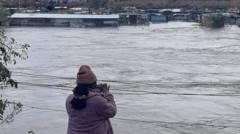Health services crucial for combating HIV in Africa face critical disruptions due to the Trump administration's abrupt freeze on funding for the President’s Emergency Plan for AIDS Relief (PEPFAR), a program that has historically saved millions of lives. Patients, like 39-year-old Sibusiso, are left in limbo as clinics shutter and confusion reigns over the continued availability of lifesaving medications.
Trump's Funding Freeze Sparks HIV Treatment Crisis in Africa

Trump's Funding Freeze Sparks HIV Treatment Crisis in Africa
A sudden halt to U.S. funding for vital HIV programs causes panic among patients and healthcare advocates across Africa.
As Sibusiso arrived at a Johannesburg clinic expecting to refill his HIV medication, he and about twenty other patients found the doors locked. Rumors of President Trump's funding cuts had spread, leading to widespread concern among individuals relying on PEPFAR. Designed to provide over $6.5 billion in assistance, this program has been instrumental in managing AIDS treatment across Africa since its inception under former President George W. Bush.
The abrupt cessation of funds sent shockwaves through communities already burdened by the HIV epidemic. Patients and healthcare providers, paired with public health advocates, expressed fear of reverting to a time when the diagnosis of HIV was tantamount to a death sentence. Sibusiso's anxiety highlights the broader implications of the freeze: “What am I going to do without this treatment?” he lamented, stressing the life-or-death nature of his situation.
The Trump administration has stated that foreign aid programs, including PEPFAR, will undergo a three-month review. Health experts predict dire consequences if this funding is permanently halted, with studies suggesting possible preventable deaths exceeding 600,000 in South Africa alone over the next decade. Despite the administration's announcement to allow the continuation of HIV medication distribution, the immediate confusion and lack of clear information left many like Sibusiso uncertain about their next steps in accessing treatment.
As the health system battles uncertainty, patients face an agonizing wait, hoping for a swift resolution but fearful of the potentially catastrophic implications of a sustained funding freeze on their lives.
The abrupt cessation of funds sent shockwaves through communities already burdened by the HIV epidemic. Patients and healthcare providers, paired with public health advocates, expressed fear of reverting to a time when the diagnosis of HIV was tantamount to a death sentence. Sibusiso's anxiety highlights the broader implications of the freeze: “What am I going to do without this treatment?” he lamented, stressing the life-or-death nature of his situation.
The Trump administration has stated that foreign aid programs, including PEPFAR, will undergo a three-month review. Health experts predict dire consequences if this funding is permanently halted, with studies suggesting possible preventable deaths exceeding 600,000 in South Africa alone over the next decade. Despite the administration's announcement to allow the continuation of HIV medication distribution, the immediate confusion and lack of clear information left many like Sibusiso uncertain about their next steps in accessing treatment.
As the health system battles uncertainty, patients face an agonizing wait, hoping for a swift resolution but fearful of the potentially catastrophic implications of a sustained funding freeze on their lives.




















